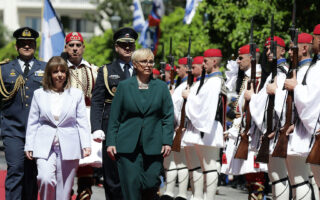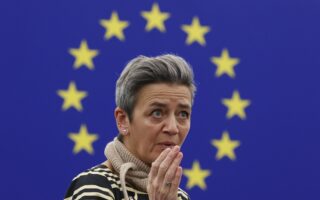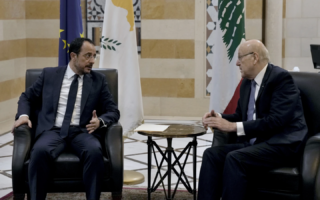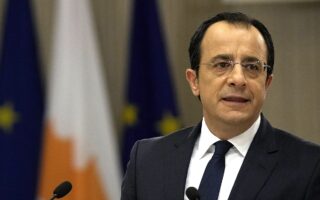Qualified majority in EU for foreign policy issues
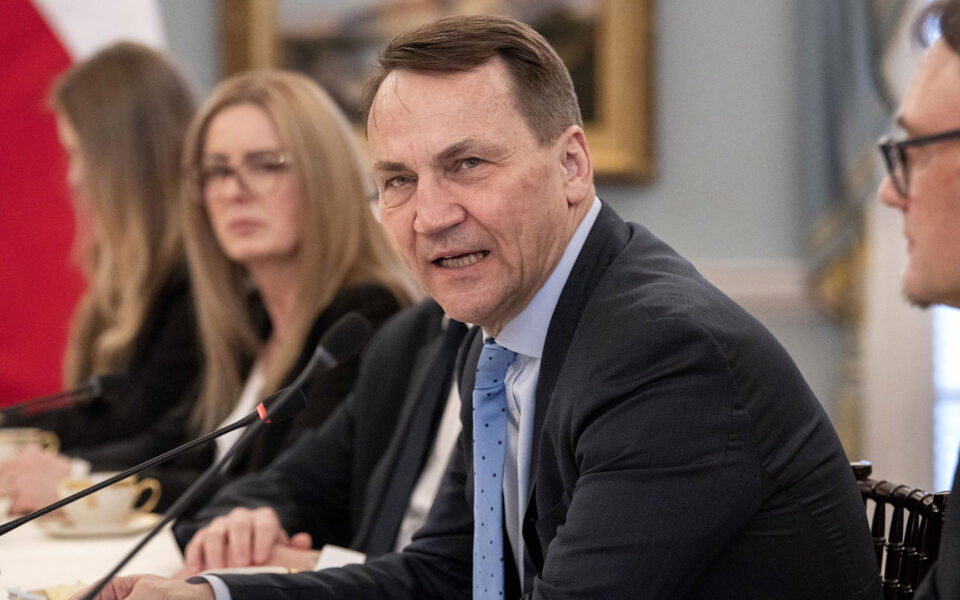
Poland’s Foreign Minister Radoslaw Sikorski says his country is in favor of the European Union adopting qualified majority voting when making decisions on certain foreign policy matters. Concerning the war in Ukraine, he notes that both sides are exhausted and that countries need to increase their support toward Kyiv.
Sikorski, who is participating in the 9th Delphi Economic Forum – which starts today and runs to April 13 – says he is “not brave enough” to say what would happen to the United States’ support for Ukraine and NATO if Donald Trump returns to the White House, but considers it imperative to strengthen European defense, saying that a “European legion” is being formed to undertake specific missions. The Polish foreign minister is in favor of EU enlargement, but “only when it comes to countries which in the long run can contribute to our power and prosperity.”
The war in Ukraine is dragging on and the news from the front isn’t very encouraging for Ukraine. Do you believe that the Ukrainian Army can take the upper hand and reverse this negative outlook on the battlefield?
The picture on the various fronts is mixed. Ukraine, a country without a navy, has pushed the Russian Black Sea Fleet out of half of that sea. The exports of grain from Odessa through the Bosporus are back to almost pre-war levels. That’s a considerable success. I don’t think any of us would have predicted a year or two ago that Ukraine would be capable of hitting Russian arms factories and refineries located hundreds of kilometers inside Russia. The Russian Army seems to have had two Pyrrhic victories: first in Bakhmut and then in Avdiivka. They took small towns but suffered huge losses. President Putin has also depleted his stores of ballistic missiles. The ones hitting Ukraine now come from current production, which is in itself a sign of Putin’s great trust in NATO being a purely defensive alliance, as these were wartime reserves. After two years of this unprovoked war both sides are exhausted. This is why we need to increase our support for Ukraine. Much depends on the American package of military assistance currently stuck in Congress. Ukraine seems to be mobilizing new recruits and we as NATO are showing resilience and our capacity to help Ukraine in the long run. Yes, Ukraine is bleeding badly, but President Putin is not successful either.
Would a change in Washington, DC, a return of Donald Trump to the White House, be bad news for Ukraine? Do you believe he will take the US out of NATO?
These are excellent questions, but I’m not brave enough to answer them.
The EU looks as if it is in some kind of confusion about its future priorities. Do you agree with what has been circulated in various ways (above all by French President Emmanuel Macron) about a stronger European defense and army? Can the EU be an international actor without US military support?
I think talking about an EU army creates unnecessary confusion because it suggests merging national armies, which I don’t think will ever happen. However, we are in the process of forming a European military capability called the rapid deployment capacity. I call it the “European Legion.” Americans are engaged in rivalry with the People’s Republic of China and Putin has defined himself as our enemy against our best wishes. Thus, we need to take a bigger share of the burden when it comes to defense. Countries like Poland and Greece have been spending solid proportions of their GDP on defense for years, therefore we have the authority to talk about it.
European defense is an idea whose time has come. European citizens in every opinion poll that I am aware of are demanding a health union, in order to be better prepared for possible health crises, and a defense union. Both pandemics and wars are not something we wish for but still need to be prepared for to better protect our people.
If this war ends at some point, do you see a turning back to some kind of normalcy between EU and Russia?
In hindsight, we can see that Russia has been at war with us for a decade. Some of us just refused to acknowledge it. But Russia has been sending death squads to European cities, pumping out disinformation and propaganda, claiming a right to dominate and to culturally transform communities against their wishes and sometimes physically eliminate them.
It harms for example the Greek community in Mariupol. Russia talks about turning the wheel of history back in places like Crimea, but Sevastopol and Theodosia don’t seem to be words of Russian origin.
In terms of enhancing a more comprehensive EU foreign policy, there is this discussion about changing the way the decisions are made through a process of qualified majority voting. Does Poland support this?
We have not yet had a proper internal discussion about it, either in my party or in our government, but I think the Polish public would support dropping unanimity in some areas, for example regarding sanctions. We have already dealt with situations when sanctions should clearly be imposed but one country for selfish reasons has either delayed them or blocked them.
The bigger the Union is, the more difficult it is to achieve unanimity. And unanimity – as we know from the times of the Greek Agora – is not the only way of making decisions in a democracy.
We used to have the unanimity principle in the Polish Parliament, but it served us very badly in the 18th century. We should keep unanimity in some areas, for example enlargement, or issues of national identity. But, personally, I am open to the discussion about a fair distribution of power which would also make the EU more functional. Just to give you an example: My political group, EPP, is in favor of unanimity rule when it comes to deciding on future missions which would employ the rapid-reaction capacity I have mentioned earlier. But all issues regarding problem-solving and management of such missions would be decided by qualified majority. Lastly, let’s just remember that qualified majority can take different forms. Frankly, I quite like the European Parliament’s idea of a four-fifths majority of member-states.
There is this discussion about the necessity to bring all European countries inside the EU family. Is this something that should be quick, or should the process be in line with EU norms and what we generally regard as the European acquis?
Firstly, let’s stick to the rules of the Treaty of Rome: Every European country can apply. According to my definition, a European country is a country with all or most of its territory in Europe.
Then, we have the Copenhagen criteria all future member-states must meet, rule of law and so on. We also have the reality that with every decade the European Union has been building up a bigger body of laws and has become more integrated. Therefore, it is harder to join as an “outsider.” Currently, we also have the experience of populist parties ruling some countries, including my own until recently. So we need security mechanisms such as the peer review we have in the financial area. And we now have peer review in the rule of law and constitutional area. Enlargement is really expensive, and it affects our internal balance of power. We have to be sure that the future members are prepared to join not only on the day of entry but as stable democracies in solidarity with our foreign policy and our values. I’m in favor of enlargement, but only when it comes to countries which in the long run can contribute to our power and prosperity.
Greece has recently become a member of the Three Seas Initiative, an extensive project in which Warsaw has been the central gear since the very beginning. Can it become a tool of better integration between the southeast and the eastern parts of Europe? Can it lead to real economic cooperation and actual projects?
Due to historical reasons, our part of the world, between the three seas, is not as interconnected as Western Europe. If the Three Seas Initiative can help to address that, then it is useful. Modernizing infrastructure and enhancing connectivity require big investments. The majority of funds will come from the EU, but the United States has also established an investment fund. I think that’s helpful. Recently, I talked to my Hungarian colleagues who claimed that Hungary has to continue to buy Russian gas because some gas interconnectors to LNG terminals on the Adriatic coast do not yet have the required capacity. If we could address such issues and be able to help one another in an emergency, we would not only be safer. We could also lower gas prices. We need better roads, cyber networks, railways. Such investments would facilitate regional trade and contribute to greater prosperity. Therefore, if the Three Seas Initiative is understood as a way of enhancing our collaboration on improving the connectivity of our region, Poland continues to support it.

